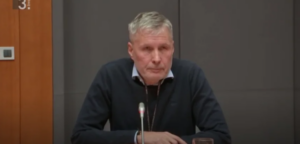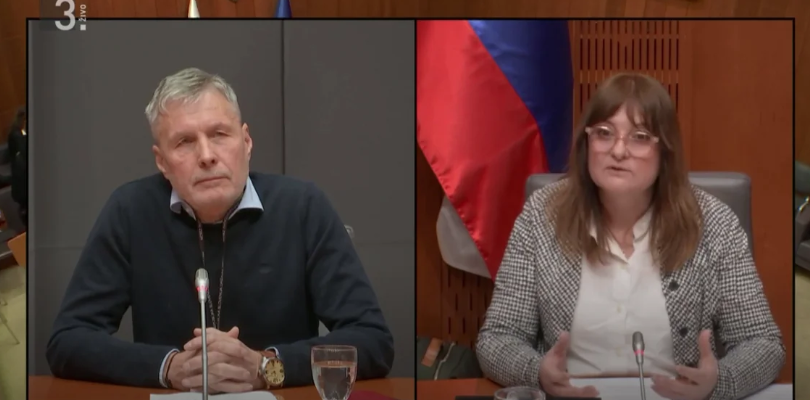“Tamara Vonta questioned Požar about the value orientation of his web portal??!!! In a similar way, the League of Communists (ZK) and the Socialist Union of the Working People of Slovenia (SZDL) used to deal with “deviant” phenomena in journalism,” the leader of the largest opposition party, Janez Janša, pointed out in light of the recent parliamentary interrogation of journalist Bojan Požar, adding that under today’s constitutional regime, no one has the right to interfere with freedom of speech.
On Friday morning, MP Tamara Vonta, the chair of the commission of inquiry aimed at prosecuting the opposition media, began questioning Bojan Požar, the director of Lanaka Media d.o.o. company, which publishes Požareport.
Each web portal can have its own editorial policy
MP Vonta asked Požar whether the portal had a world-view orientation. He replied no, because it does not deal with ideological issues. “We deal with stories concerning abuse of office and public money and the like.” He said that he was not involved in artificially imagined scandals and that he had also been involved in finding irregularities during the Janez Janša government. MP Vonta then put on the table a pile of prints of Požar’s articles, where there was not a single one that was critical of Janša. “That’s your opinion,” Požar replied, adding, “Even if what you say were true, that is not a matter for this commission. After all, every web portal can have its own editorial policy,” Požar was clear. Although this is absolutely true, the chair of the commission replied, “Well, that is not completely true.” “It is completely true,” Požar replied.
Požar was surprised to learn that his company was among those investigated
At the very beginning of the hearing, Požar explained that he was surprised that his company was among those being investigated, given that in its almost 25 years of existence, the company had not had any transactions with any political party or with any politician or other public official. “In my opinion, this company does not meet the elementary conditions to be investigated. I therefore believe, and so do many lawyers I have spoken to, that, at least as far as I am concerned, the investigation is completely illegal,” he pointed out, adding that, after all, they were not carrying out any political propaganda. “This is evident every day from the content of the portal.”
Požar: I am less of a politician than your colleague, Mr Modic
The chairwoman of the commission asked him whether he was a journalist or a politician. He explained that he had been in journalism since 1989. He was a politician only in 2018, when he and his friends created a non-party list and went to the parliamentary elections. According to him, this was a journalistic challenge for him because he wanted to see a political campaign from the inside. “I’ve never been a politician for a living, and I find the accusations of being a politician ridiculous.”
However, he reminded Vonta that he is less of a politician himself than their colleague Mr Modic, who is actually sitting here and getting paid by politicians. To this, Vonta replied, “Okay, but he is not being investigated by this commission of inquiry.”
When asked whether Rok Snežič had helped the party financially between the years 2020 and 2022, Požar said no. He had not even seen him for 15 years. He assured everyone, however, that the editorial policy of the portal had not changed during the political campaign, nor had he used it for self-promotion.
“There are no targets in the journalism I practise,” Požar replied when asked whether any of Janša’s ministers had been targeted. He added that he had problematised the composition of Janša’s government and had written an article about it. He also said that during the period under investigation, during the Janša government, the publisher of the portal had seen its revenues reduced by almost 30 percent. The cancellation of state advertising, he said, was also at the expense of the Covid-19 epidemic. That is why he also stopped producing his show, Faktor. “If the articles were favourable to Janša, according to your logic, there would be enough money for me, right?” Požar was clear.
Požar was even asked by MP Vonta whether he was aware of Hungarians editing content on Nova24TV. “How could I sense that if I don’t work there. I don’t know,” he replied. A lot of attention was paid to advertising. As Požar said, it is not a matter of handing out favours, because things are very precise. “Last year, the most read article on this web portal, related to the Litijska Street affair, the Freedom Movement party (Gibanje Svoboda) and the Social Democrats (Socialni demokrati – SD), had 177 thousand views (two and a half times more than the show Odmevi – Echoes),” Požar was clear. When Vonta retorted that other articles elsewhere were achieving similar numbers, he reminded her that no, they themselves publish one article a day, and they don’t advertise nudity or the traffic situation, which is what brings in clicks to other outlets.
“What a question, can you please be serious? You are asking me about gossip,” Požar was indignant when the chairwoman of the commission asked him whether he had met Dušan Mes in a bar to discuss advertising. He explained that most of the communication about advertising is done by phone and e-mail. “We get the money to publish the ad, we send an invoice, we get the reach data, the company pays.” MP Vonta even asked him if he had ever been paid in the run-up to the elections for the media’s criticism of Golob with allegations that she said had turned out to be untrue. “I am not involved in media murders; I am not paid for certain articles. Which accusation turned out to be untrue?!” he replied.

The Požareport portal has a greater reach than the newspapers Dnevnik and Večer
MP Vonta also confronted him with media reports that Požareport had received more than half a million euros in advertising money from state-owned Telekom over seven years. He stressed that this was completely false information. “I assume that this is the amount paid by Telekom to the publisher of Požareport for the production of the Faktor programme; they advertised on the programme, it was not just on the portal,” he pointed out. 40 percent of these funds went to the portal, and the rest went to the show (40 percent to the portal, 60 percent to the show). However, he added, this was normal, as his portal, he said, had a greater reach than, for example, the newspapers Dnevnik and Večer.
A. H.


